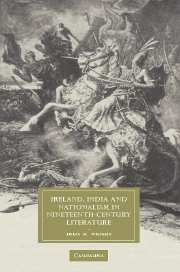Book contents
- Frontmatter
- Contents
- Acknowledgments
- Introduction: Insensible Empire
- PART I National Feeling, Colonial Mimicry, and Sympathetic Resolutions
- 1 “National feeling” and unfeeling empire: the politics of sensibility
- 2 Empowering the colonized nation; or, virtue rewarded
- 3 Travellers, converts, and demagogues
- PART II Colonial Gothic and the Circulation of Wealth
- Conclusion: The Wild Irish Boy in India
- Notes
- Bibliography
- Index
- CAMBRIDGE STUDIES IN NINETEENTH-CENTURY LITERATURE AND CULTURE
2 - Empowering the colonized nation; or, virtue rewarded
Published online by Cambridge University Press: 31 July 2009
- Frontmatter
- Contents
- Acknowledgments
- Introduction: Insensible Empire
- PART I National Feeling, Colonial Mimicry, and Sympathetic Resolutions
- 1 “National feeling” and unfeeling empire: the politics of sensibility
- 2 Empowering the colonized nation; or, virtue rewarded
- 3 Travellers, converts, and demagogues
- PART II Colonial Gothic and the Circulation of Wealth
- Conclusion: The Wild Irish Boy in India
- Notes
- Bibliography
- Index
- CAMBRIDGE STUDIES IN NINETEENTH-CENTURY LITERATURE AND CULTURE
Summary
“[Y]ou are now here to receive from the Mayor of the city the gratifying acknowledgment, that Montreal looks upon you, not as step-children or as foreigners, but as children of her own household, whom she does not distinguish unfavourably from any of her other children. (Loud cheers.) His Worship the Mayor has a large family; pretty well up to 130,000 of us; what we call in Ireland ‘rather a heavy charge.’ But it is pleasant for him, and for us all, to know that we are all pretty well able to take care of ourselves, and the Irish part of us not less so than others.”
Thomas D'Arcy McGee, speech in Montreal, Canada (St. Patrick's Day, 1866)The discourse of sensibility, offering a model of universal sympathy that emphasizes human connection over social or cultural difference, makes it possible to conceive of the colonized nation as something other than, in Deane's phrase, a “strange country.” While many of the texts of the preceding chapter were positioned as rhetorical volleys in a heated public debate, the texts discussed in this chapter seek to persuade in the less confrontational and less public terms of the novel's conventionalized engagement with family and education. In Morgan's The Wild Irish Girl, the heroine's education of the hero extends her power to direct his sensibility: her pedagogical force rests not on the extremity of her suffering but on the extent of her information about the suffering of the Irish people and the infectiousness of her own sensibility.
- Type
- Chapter
- Information
- Publisher: Cambridge University PressPrint publication year: 2007



